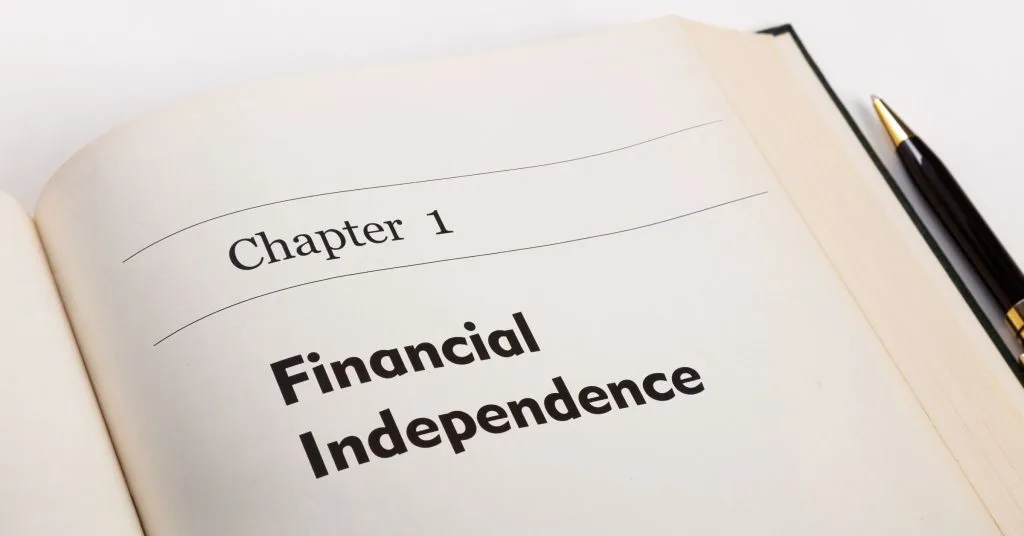Financial literacy is not taught in school and most American families avoid topics like money. It’s up to you to seek out and read the best books on financial independence. You can be the person who changes your families financial future forever.
Your goal isn’t to be the richest man in the city but you do want to develop different ways to grow your wealth so you can be comfortable. A lot of people pretend money isn’t important to them as a means of self preservation because they have the strategies to become financially independent.
Don’t use lack of positive financial role models as an excuse for staying poor. These are some of my favorite books for understanding money, building wealth, and becoming financially free.
When you click on an Amazon link from my site the price is the same as if you searched for it yourself, but I get compensated. As an Amazon Associate I earn from qualifying purchases.
1. “The Simple Path to Wealth” by JL Collins
JL Collins’s “The Simple Path to Wealth” is an essential guide for anyone seeking financial freedom. In his personal finance book, Collins demystifies complex financial concepts, such as the stock market and asset allocation, using a conversational style that’s easy to understand. It’s an excellent choice if you’re looking into the best books on financial independence.
- Financial Planning Made Accessible:
- Understand why index funds can be a vital tool in your investment arsenal.
- Learn about money management strategies that pave the way to financial success.
- Discover how simple decisions can lead to profound impacts on your financial future.
- A Holistic Approach to Investing:
- Embrace a holistic view of personal finance, from real estate to the stock market.
- Find out why a qualified financial advisor may not be necessary for everyone.
- Develop your asset allocation skills to enhance long-term wealth.
In “The Simple Path to Wealth,” you’re invited to explore a framework for achieving financial independence that goes beyond mere tips. The guidance provided is about fostering a mindset that can lead to a rich and free life through disciplined and informed investment strategies. Make this book your companion on your journey to financial autonomy.

2. “Rich Dad Poor Dad” by Robert Kiyosaki
“Rich Dad Poor Dad” is a cornerstone piece among the best books on financial independence. Robert Kiyosaki’s advice has helped countless people take charge of their finances. It should be noted though, that Kiyosaki’s paid programs have gone bankrupt because of financial mismanagement. Much of his advice can be useful, but do not follow in his footsteps of greed and over leveraging.
Understanding Wealth through Two Fathers
Kiyosaki’s storytelling revolves around the “poor dad,” his biological parent, and the “rich dad,” his friend’s father. Poor dad represents the conventional belief in academic and professional success as the sole path to financial security. In contrast, rich dad demonstrates through action that smart investments and financial education establish the groundwork for wealth.
The Path Laid Out by Rich Dad
Your journey toward financial expertise can be enriched with practical advice from Kiyosaki’s work. “Rich Dad Poor Dad” explores the dynamics of real estate and investing as robust methods for income generation. It refutes the myth that a high income is required to attain prosperity.
Achieving Your Financial Goals
The book offers a step-by-step plan that encourages you to assess your own financial beliefs and goals. Kiyosaki’s principles aim to shift your financial mindset towards generating wealth. Tools such as the Rich Dad’s Cashflow Quadrant are introduced to help you understand the different ways to approach income and asset building.
3. “The 4-Hour Workweek” by Tim Ferriss
If you’re exploring the best books on financial independence, “The 4-Hour Workweek” deserves your attention. Authored by Tim Ferriss, this influential guide proposes a radical shift in the work-life balance equation. It introduces you to the concept of escaping the 9-5, living anywhere, and joining what Ferriss calls the ‘New Rich’.
Key Components:
- Side Hustle: Ferriss emphasizes the value of creating income streams that don’t require your constant attention.
- Passive Income: Learn strategies to make money with minimal ongoing effort.
- Own Business: Ideas on automating business to increase profits while freeing time.
Time Management & Efficiency:
- Ferriss offers practical advice on managing your time better, prioritizing tasks and eliminating time-wasters.
Step-by-Step Guide:
- The book provides actionable steps to help you transition from full-time work to a life of freedom. You’ll find tips on negotiation, automation, and outsourcing.
“Early Retirement Extreme” and the idea to “retire early” get real-world application, not just theory. By implementing Ferriss’s strategies, your journey to financial independence can both start and gain momentum. Give “The 4-Hour Workweek” a read and take a bold step towards reshaping your future.

4. “I Will Teach You to Be Rich” by Ramit Sethi
Ramit Sethi, a personal finance advisor and successful author, brings you “I Will Teach You to Be Rich,” a guide designed to assist you on your journey to financial independence. Highly regarded as one of the best financial literacy books, Sethi’s work combines a straightforward guide with practical strategies to help you manage your money with confidence. Whether you’re tackling student loans or navigating tax-advantaged accounts, this book is tailored to provide clarity.
The book is framed as a 6-week program, focusing on actionable steps to improve your financial health. From setting up high-interest bank accounts without fees to learning how to crush debt more effectively, Sethi’s advice is meant to deliver results. You’ll discover how to grow your savings and invest smartly, putting you on a fast track to making your money work for you.
One of the key components of “I Will Teach You to Be Rich” is its approach to practical money management techniques that you can apply immediately. As part of the best books on financial independence, it addresses common financial concerns with practical strategies, empowering you to make informed decisions. With Sethi’s friendly advice, you’ll learn to spend on what you love without guilt and understand how to navigate the financial world with ease.
5. “Your Money or Your Life” by Vicki Robin and Joe Dominguez
If you’re on the hunt for the best books on financial independence, “Your Money or Your Life” should be at the top of your list. Authored by Vicki Robin and Joe Dominguez, this book introduces you to a holistic approach to achieving financial stability. It’s not merely about money—it’s about aligning your financial actions with your personal values.
Key Elements:
- Holistic Approach: Addressing both the practical and psychological aspects of money management.
- Financial Stability: Steps towards reaching and maintaining it for peace of mind.
- Program of Extreme Savings: Strategies for significantly reducing expenses to increase savings rate.
Vicki Robin offers insights into developing a program of extreme savings designed to help you accumulate enough money to live life on your terms. Through a nine-step program, you’re guided to reassess your financial life, focusing on what truly matters to you.
Benefits of Reading:
- Gain control over your finances.
- Learn to save more effectively.
- Align your spending with your values.
This book stands as a great place to begin reshaping your financial life. By following this program, you’re not just making a living, you’re paving the way to make a life that’s enriching and authentic to your personal vision.

6. “The Total Money Makeover” by Dave Ramsey
In tackling debt and aspiring for financial independence, Dave Ramsey’s “The Total Money Makeover” is a cornerstone addition to your library. Full transparency, I hate including Dave Ramsey on any list I produce. The percentages of your income that he assigns to different categories are entirely un-realistic to the vast majority of Americans. Never mind he leaves out entire categories of expenses as if student loan payments would never be due simultaneously with childcare payments.
This celebrated book focuses on idealistic principles of debt reduction and solving a financial crisis.
Embrace a strategy that has guided countless people to financial wellness. Ramsey emphasizes the importance of personal accountability and the transformative power of organizing your finances. The book stands out in the best books on financial independence for its cut and dry approach and actionable advice.
Here’s what you’ll find in “The Total Money Makeover“:
- Bold simplicity: A no-nonsense guide through the complexity of finances.
- Relatable scenarios: Real-life stories that mirror your own challenges.
- Actionable steps: Concrete steps that lead to meaningful change.
By following Ramsey’s step-by-step plan, you’ll learn how to navigate out of debt towards financial security. Equip yourself with one of the most potent tools for claiming freedom from money woes.

7. “The Millionaire Next Door” by Thomas J. Stanley
“The Millionaire Next Door” might change your view on financial success. Co-authored by Thomas J. Stanley, this iconic book breaks down the common traits of those who’ve accumulated wealth. It’s often recommended as one of the best books on financial independence.
Unveiling the Myth You might think millionaires live extravagantly. However, Stanley’s research reveals that true wealth may be right next door, hidden by frugality and smart financial habits. This book teaches you that financial security isn’t about earning the most, but making the wisest decisions with your money.
Live on Your Own Terms You’ll learn how to achieve financial independence by living below your means. The emphasis is on gathering assets, not liabilities. It’s an empowering guide showing you that it’s possible to become wealthy through discipline and modest living.
Key Takeaways in Brief:
- The typical millionaire avoids big spending to preserve wealth.
- Financial stability comes from long-term planning and saving.
- Anyone can adopt the lifestyle habits that lead to accumulating wealth.
8. “Quit Like a Millionaire” by Kristy Shen and Bryce Leung
“Quit Like a Millionaire” is not just a guide; it’s an inspiring roadmap to financial freedom. Authored by Kristy Shen and Bryce Leung, key figures in the FIRE (Financial Independence, Retire Early) movement, this book provides actionable strategies for you to retire early. Their personal journey from living on $0.44 a day to retiring in their early 30s underscores their authority on the subject.
Key topics covered include:
- Financial Independence: Discover tailored advice on achieving financial independence.
- House Hacking: Learn unique savings strategies such as “house hacking.”
- Retiring Early: Shen and Leung’s formula for retiring early may reshape your financial perspective.
This book is regarded as one of the best books on financial independence for its relatable narrative combined with practical financial advice. Kristy Shen’s upbringing in poverty and subsequent rise to millionaire status by age 31 exemplifies the book’s accessibility and realism.
Why Read This Book?
- Real-Life Insights: Relate to Shen’s transformative story from hardship to wealth.
- Step-by-Step Guide: Follow a clear, replicable plan towards retiring early.
- Accessible Tips: Absorb practical tips that are easy to apply in daily life.
Shen and Leung’s approach aligns with philosophies from widely recognized financial resources like “The Barefoot Investor,” but their book stands out for its relatability and engaging storytelling. Embrace their wisdom, and you could take confident steps toward crafting your very own early retirement story.

9. “Playing with FIRE (Financial Independence Retire Early)” by Scott Rieckens
If you’re on the hunt for the best books on financial independence, “Playing with FIRE (Financial Independence Retire Early)” should pique your interest. Authored by Scott Rieckens, this book is a candid introduction to the FIRE movement, aimed at both newcomers and seasoned veterans alike. The primary focus is on the core principles that make up the pillars of financial independence.
Rieckens takes you through stories of everyday people who have chosen to dominate life financially. He pulls back the curtain on the realities of pursuing financial freedom, providing practical advice through engaging case studies. This approach helps you understand the complexities behind the decision to retire early.
As one of the early books in the genre, “Playing with FIRE” is more than just theoretical, it’s a roadmap for your own journey. The author’s personal anecdotes make it a great addition to your financial literacy library, encouraging you to reflect on what money means to you. The book guides you on how to shift your mindset towards a life that values happiness over excess.
Importance of Financial Education
Financial freedom is equal parts earning more and making smart decisions with your money. Starting with the best books on financial independence is an excellent first step.
You can’t budget your way out of an income problem just as you can’t earn your way out of a spending problem. Becoming financially free requires learning about both sides of the wealth equation.
Building Wealth with Simplified Strategies
It is shocking to find out how many people don’t have a budget or even know what their total income. No matter where you are in your wealth building journey, knowing your numbers is a good thing.
Designing a Balanced Financial Life
In recent years the emphasis has shifted from keeping up with the Joneses to creating your own happy life. Every person deserves the freedom to focus on the most important things for them.
Following a Practical Guide to Generational Wealth
When you follow steps from an eye-opening book it can change the financial future of all your future generations. You are really just one great book away from generational wealth.
Embracing the Journey Towards Financial Independence
Dedicating time to understanding and applying the principles from these top FIRE books can lead to significant improvements in your financial status. Retirement plans aren’t handed over on a silver platter anymore with company pensions, you have to create that security yourself.




Leave a comment